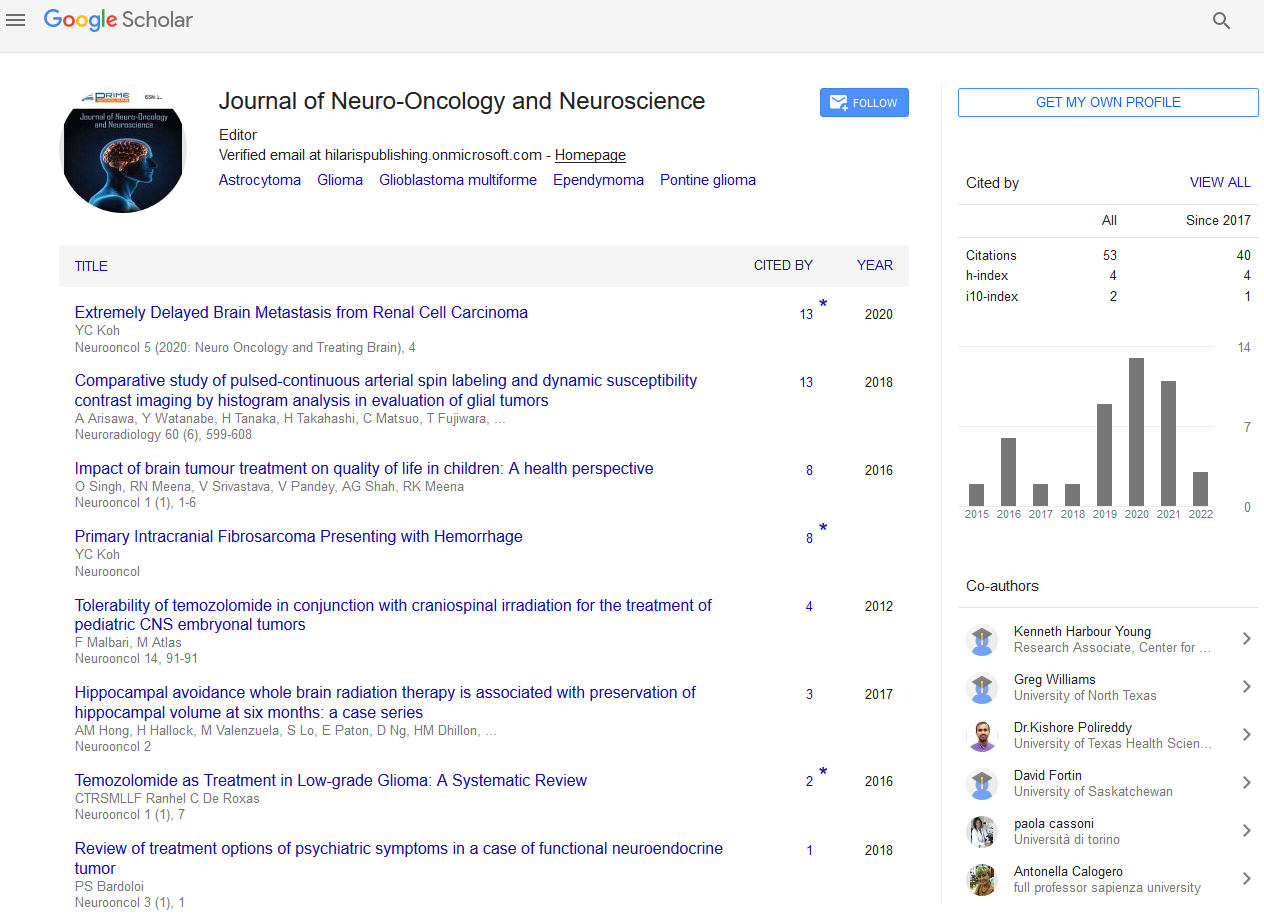Commentary - (2024) Volume 9, Issue 3
Exploring the Neurocognitive Effects of Brain Tumor Treatments: Implications for Patient Outcomes and Quality of Life
Wolfgang Johan*
Department of Neuro Oncology, University of Arizona, United States
*Correspondence:
Wolfgang Johan,
Department of Neuro Oncology, University of Arizona,
United States,
Email:
Received: 02-Sep-2024, Manuscript No. IPJNO-24-21306;
Editor assigned: 04-Sep-2024, Pre QC No. IPJNO-24-21306 (PQ);
Reviewed: 18-Sep-2024, QC No. IPJNO-24-21306;
Revised: 23-Sep-2024, Manuscript No. IPJNO-24-21306 (R);
Published:
30-Sep-2024, DOI: 10.21767/2572-0376.9.3.29
Introduction
Brain tumors are among the most challenging types of
cancer to treat, not only because of their location but also
due to the potential impact on cognitive functions. As
advances in treatment options, such as surgery, radiation, and
chemotherapy, continue to improve survival rates, the focus
has increasingly shifted to understanding and managing the
neurocognitive effects that often accompany these therapies.
Neurocognitive effects refer to changes in cognitive functions
such as memory, attention, executive functioning, language,
and processing speed. These changes can significantly affect
a patient’s quality of life, making it crucial to understand
their causes and how they can be managed or mitigated. The
neurocognitive effects of brain tumor treatments are primarily
caused by three main factors the tumor itself, the surgical
intervention, and the adjuvant therapies like radiation and
chemotherapy.
Description
Depending on the location of the tumor, patients may
experience cognitive deficits even before treatment begins.
Tumors in regions responsible for language, memory, or
executive function are particularly prone to causing such
impairments. While surgery aims to remove as much of the
tumor as possible, it can also lead to temporary or permanent
cognitive deficits, especially if the tumor is located in or near
areas responsible for critical cognitive functions. For example,
surgeries involving the frontal lobes can affect decision-making
and problem-solving abilities, while those near the temporal
lobes can impact memory and language. Radiation therapy,
particularly whole-brain radiation, is known to have significant
neurocognitive side effects. This treatment can cause damage
to healthy brain tissue, leading to a decline in cognitive
functions over time. Similarly, chemotherapy, especially drugs
that cross the blood-brain barrier like temozolomide, can
result in “chemobrain,” a term used to describe the cognitive
fog experienced by many patients. Neurocognitive effects
can vary in duration. Some patients experience short-term
effects, such as confusion or memory lapses immediately
following treatment, which may resolve over time. However,
others may suffer from long-term or even permanent deficits.
Studies suggest that the risk of long-term cognitive impairment
increases with higher doses and prolonged exposure to
radiation and chemotherapy.
Conclusion
Regular neurocognitive assessments are essential for patients
undergoing brain tumor treatments. These assessments
can help identify cognitive changes early, allowing for timely
intervention. Additionally, they provide valuable data for
ongoing research aimed at understanding the full spectrum of
neurocognitive effects and how to manage them effectively.
The neurocognitive effects of brain tumor treatments present
a significant challenge, but ongoing research and advances
in treatment techniques are paving the way for better
management and mitigation strategies. As the field continues
to evolve, the focus on preserving cognitive function alongside
extending survival will remain paramount, ensuring that
patients not only live longer but also maintain a higher quality
of life.
Acknowledgement
None.
Conflict Of Interest
The author declares there is no conflict of interest in publishing
this article.
Citation: Johan W (2024) Exploring the Neurocognitive Effects of Brain Tumor Treatments: Implications for Patient Outcomes and Quality of Life. Neurooncol. 9:29.
Copyright: © 2024 Johan W. This is an open-access article distributed under the terms of the Creative Commons Attribution License, which permits unrestricted use, distribution, and reproduction in any medium, provided the original author and source are credited.

